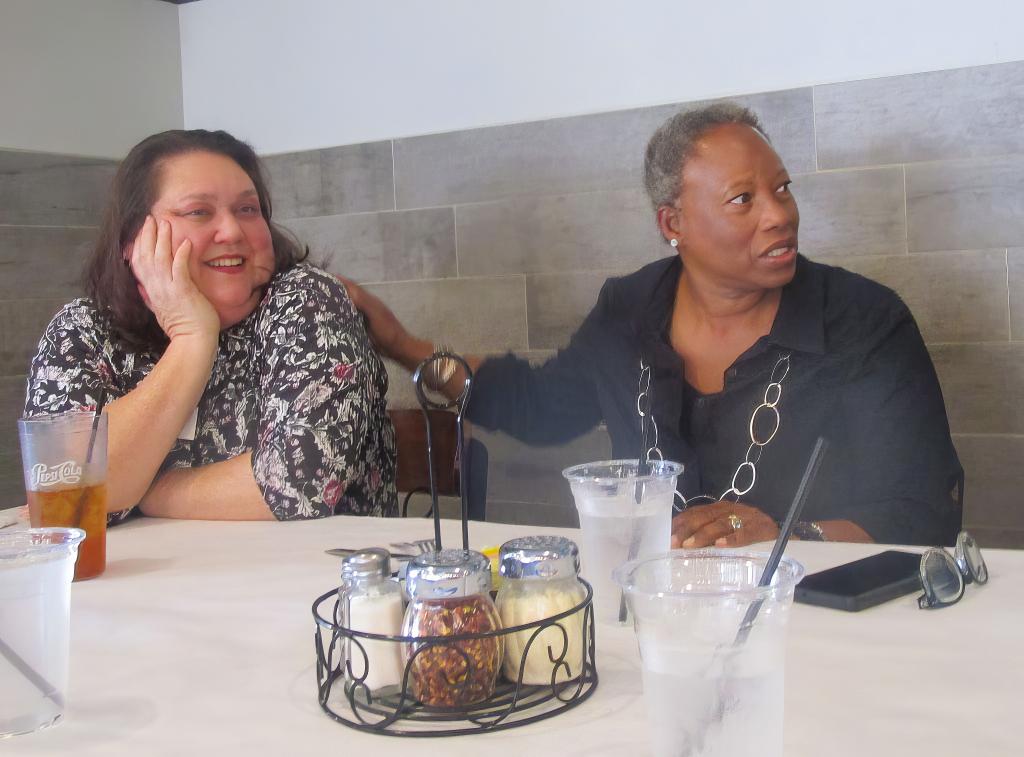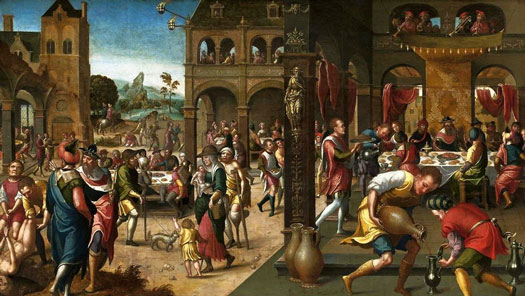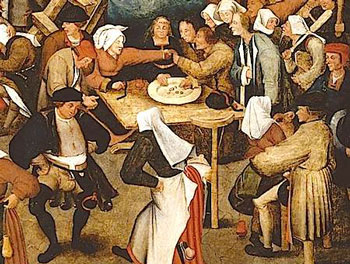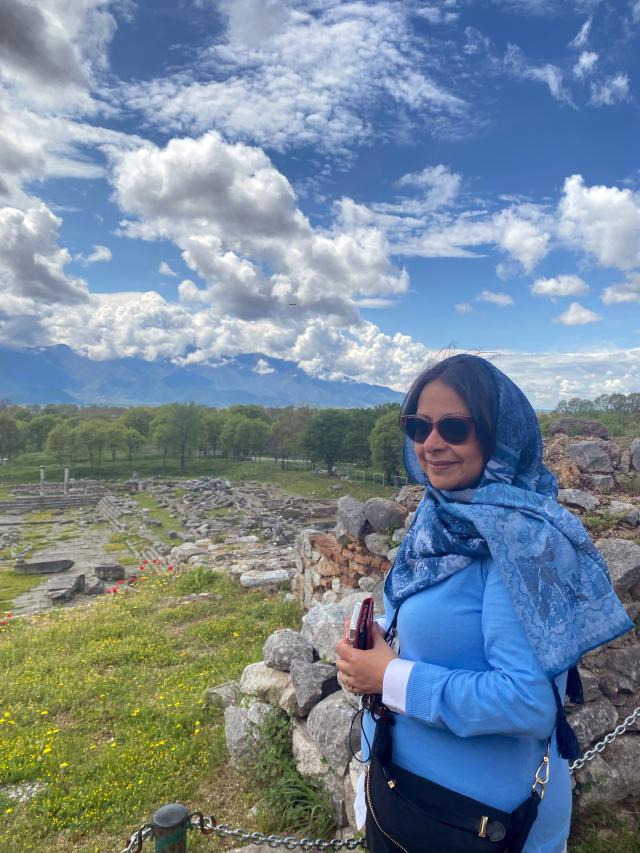1. Opening hymn – “Oh Let the Song of God enfold you”
2. Sequence Hymn – “Here, O my Lord”
3. Gospel and Sermon – Rev. Catherine Hicks
St. Peter's Episcopal Church, Port Royal, VA

We are a small Episcopal Church on the banks of the Rappahannock in Port Royal, Virginia. We acknowledge that we gather on the traditional land of the first people of Port Royal, the Nandtaughtacund, and we respect and honor with gratitude the land itself, the legacy of the ancestors, and the life of the Rappahannock Tribe. Our mission statement is to do God’s Will in all that we do.
1. Opening hymn – “Oh Let the Song of God enfold you”
2. Sequence Hymn – “Here, O my Lord”
3. Gospel and Sermon – Rev. Catherine Hicks
Click here to view in a new window.
One of the most beautiful messages that All Saints’ Day brings to light is that God is truly with us in our actual humanity. By inviting Christians to perceive ourselves as saints, this feast calls us to understand that our embodied human lives are completely intertwined with God’s sacred presence because God has chosen to be in relationship with us. God’s presence with us doesn’t suppress or subtract our humanity; instead, God embraces all our humanity—limits, graces, imperfections, and all.
Taking our actual embodied humanity seriously in how we talk about saints on All Saints’ Day can open up powerful formation conversations. An image that I find generative for envisioning God with actual human people appears in the book Where God Happens by former Archbishop of Canterbury Rowan Williams. In a discussion about loving a neighbor, he says, “You become a place where God happens.” While he uses this metaphor to describe how an act of love enables a neighbor to encounter God in and through their fellow human being, it also points to the phenomenon of being and becoming saints, actual human beings in relationship with God. Our lives become sacramental places where God shows up for us and with us. If we situate this language in our bodies and humanity, it can liberate us from believing that our bodies, humanity, or identities are hindrances to God and show us how to let God embrace all that we are, “with God’s help,” as we say.
The Feast of All Saints also points Christians toward the words that we recite in the Apostles’ Creed: “I believe in . . . the communion of saints.” This creedal confession reminds us that our faith is not individual-centered but communal. While the communion of saints often gets described as a mystical body of Christ that unites Christians past, present, and future, this image also suggests that being saints entails being in communion with one another and with God. In this way, All Saints’ Day invites us to recognize that Christians, as members of the communion of saints, are holy together, saints together. God’s Spirit draws us with our differences and diverse experiences into relationships with one another in God, and this togetherness is integral to the sacredness that defines saints’ lives.
Mystery is another theme of All Saints’ Day—a theme that Jennifer McNally and Anna V. Ostenso Moore note in “What Does This Day Mean? Handout for The Feast of All Saints & All Souls at Home.” When lives of faith take on a sacramental quality and become knit to a communion of saints throughout past, present, and future, we inhabit the mysterious unknowns of God’s ways. We become part of something much bigger than ourselves, and what God may be doing in and through us can surprise and elude us. All Saints’ Day points us toward the mystery that we may be to ourselves and to one another through the incomprehensibility of God’s redemptive and life-giving work among us. It invites us into a simultaneously empowering and humbling posture of welcoming unknowing with God and one another.
One way that we can approach this theme of unknowing is to reflect on our place within the communion of saints. Just as people who came before us have inspired and enriched our lives of faith in ways neither they nor we may fully realize, we don’t know what God will do in future generations through our presence in this communion. This long view of our participation in the movement of God, for whom nothing is lost or beyond redemption, enables unknowing to be a space of hope, solidarity, and courageous, faithful action rather than a source of fear or inaction.
All Saints’ Day is certainly about the holy. Holiness, though, can conjure unhelpful images of a punitive God demanding unattainable requirements of absolute submission and sinlessness. What can guide us toward a more life-giving understanding of holiness on All Saints’ Day is love. While John Wesley’s writings first introduced me to this idea, a chorus of scriptures and theologians throughout Christian faith, including I Corinthians 13, Augustine of Hippo, and Julian of Norwich (to name a few), shows us ways of placing love at the center of what holiness means and looks like.
When love becomes our icon of the holy, it expands and transforms our way of being in the world with God and with one another. Being saints becomes first and foremost about letting God love us. Acts of love that may seem small nevertheless forge powerful moments that join people to one another, heal wounds, and endure. Compassion, repair, reconciliation, nonviolence, and spaces held for vulnerability become precious places to seek and find the sacred.
A final theme that All Saints’ Day features is baptism. Because this feast is one of the recommended occasions for baptism, it provides a meaningful opportunity to grapple with the significance of this rite of initiation into the body of Christ. The communal emphasis of All Saints’ Day enables us to pay particular attention to the community we join in baptism. The “not yet” dimension of the communion of saints for us on this side of eternity also helps us tune into the promise of being “sealed by the Holy Spirit and marked as Christ’s own for ever” in baptism (The Book of Common Prayer, 308).

Representatives from Sacred Ground met with Jessica Thompson, Executive Director of the Germanna Educational Foundation, for lunch at Castiglias in Fredericksburg on Oct. 10, 2023. The goal was to determine how we could move forward with a new focus on our scholarships for students.
Our time together will include a short prayer service at noon, which will include spoken prayers and some meditative music.
After this opening, people are invited to use the various resources that will be available in the church as we pray silently in solidarity with one another and with others around the world who will also be praying for peace.
A short prayer service at 1:50PM will conclude our time of prayer together.
The focus this Sunday continues to be the stewardship campaign. We also are looking ahead to All Saints Sunday, Nov 5 in 3 weeks
Lectionary link for Oct. 15, 20th Sunday after Pentecost
Looking ahead…
I.Theme – Preparing for the banquet to come.

"Parable of the Great Banquet"– Brunswick Monogrammist, 1525, Netherlands
The lectionary readings are here or individually:
Old Testament – Isaiah 25:1-9
Psalm – Psalm 23 Page 612, BCP
Epistle –Philippians 4:1-9
Gospel – Matthew 22:1-14
The texts today speak of a universal banquet. Only those who exclude themselves are left out. The people of ancient Israel were on their way out of the banquet through their fashioning of idols.
Edward Gomez
“What are you going to do with this?”
—Matthew 22:1-14
Many years ago, when I was studying for the priesthood, we were called to help on Sundays at some of the local parishes. That semester I was called to serve at St. Thomas More Church. New to the area, I was unaware that this church was one of the most affluent churches in the diocese. I entered the sacristy that Sunday and met the rector. He turned to me impeccably dressed in a black suit and with an extended hand and a broad welcoming smile, introduced himself saying, “Hi! Welcome to our church!” Then, almost immediately, from behind came another priest who did not fit the dress code of this marble-laden English castle, who gave me a surprising I’ve known you all my life embrace! I smiled — actually laughed — and said, Hi! He was a missionary in Africa and the guest preacher that day.
His sermon was moving as he shared his experience with the poor. I felt like I got hit in the chest with God asking me, “So what are you going to do with this?” The collection that day was for the missions. After the service I was invited to lunch with the rector, the missionary preacher and other guests of the ector. During lunch, a man entered handed a small envelope to the rector saying, “What shall I do with this?” The envelope contained a set of earrings and a note saying, “Take these and have them appraised, and whatever that amount is, I will sell them and give the money to the missions.” We were all taken aback by this act of giving. But it was not until almost a month later that we learned the earrings were valued at $175,000!

When you encounter God’s call, the almost immediate reaction is to let go of everything you thought important so that you can be free to love. Giving generously becomes easy because at some level you realize that what you have is not yours — but God’s. And if wealth or privilege has been entrusted to you, then you know — with certainty — that you must share it.
I don’t know who this woman was, or her life circumstances. I just know that when she ripped off those earrings, she responded to God’s question, “So now what are you going to do with this?” She acted and gave far more than expensive earrings; she gave of herself honestly, freely and out of pure love.
 Edward Gomez is Vicar of St. Paul’s/San Pablo Episcopal Church in Houston. His ministry has led him from the Lancandonan jungle of Mexico to the Peruvian province of Madre de Dios as a missionary, to the nonprofit world, where he has served in various leadership roles, including as the Executive Director of El Buen Samaritano Episcopal Mission in Austin. He is married to Denise Trevino-Gomez; they have three children and one adorable granddaughter.
Edward Gomez is Vicar of St. Paul’s/San Pablo Episcopal Church in Houston. His ministry has led him from the Lancandonan jungle of Mexico to the Peruvian province of Madre de Dios as a missionary, to the nonprofit world, where he has served in various leadership roles, including as the Executive Director of El Buen Samaritano Episcopal Mission in Austin. He is married to Denise Trevino-Gomez; they have three children and one adorable granddaughter.

Pieter Brughel, Pieter Brueghel the Younger, The Wedding Dance in a Barn, c. 1616
From John Pilch’s article on the Sunday website of Saint Louis University
"Some background knowledge of meals in antiquity sheds light on today’s parable. Meals reproduce in miniature the everyday social relations of a society. Who eats with whom at a given table reflects who can associate with whom in the larger society.
By Summerlee Staten, Trinity NY

“Last April (2023), Trinity (NY) pilgrims visited Philippi (shown in the image), where the Apostle Paul founded the church that received his letter to the Philippians. Visiting the site of Lydia’s baptism, we celebrated the ministry of women in the early church. Lydia and her household were the first Christian converts of St. Paul in Europe. Link to Trinity’s trip
“Wherever I go these days, both inside and outside the church, I hear people talk about how disheartened and nervous they are. Our news feeds and social media pages barrage us with stories of displacement, war, racial violence, and families torn apart by political disagreements. We are filled with grief at the losses we see around us, but also afraid for our own security in a world that feels inherently insecure. Divisiveness is everywhere, and with this discord comes a profound lack of trust in community.
“As it turns out, the Apostle Paul was no stranger to the problems of divisiveness and worry. This past summer at Trinity, in an intensive Bible study on his letter to the Philippians, we saw how Paul encouraged the early church to be of one “mind,” or phroneo in Greek, a word that indicates a wise pattern of thought. Paul uses this word repeatedly to indicate that the transformation of our minds — our very ways of thinking — only occurs when we are rooted in our unity with Christ.
Editor’s Note – Since 1987, October has been designated Domestic Violence Awareness Month in the United States. This October, domestic violence was already in the public eye due to a series of incidents involving professional football players. According to statistics compiled by the National Coalition Against Domestic Violence (NCADV), one in three women has experienced physical violence at the hands of an intimate partner. For 3.2 million women, that violence is “severe.” Less frequently, but no less seriously, men are victims: One in ten has been stalked, physically harmed, or raped by an intimate partner. Domestic violence constitutes 15 percent of all violent crimes.
This Odyssey Networks story takes issues of public and private wrangling evident with the Philippians in our Epistle this week and links them to issues of bullying and domestic violence in our time.
Click here to view in a new window.